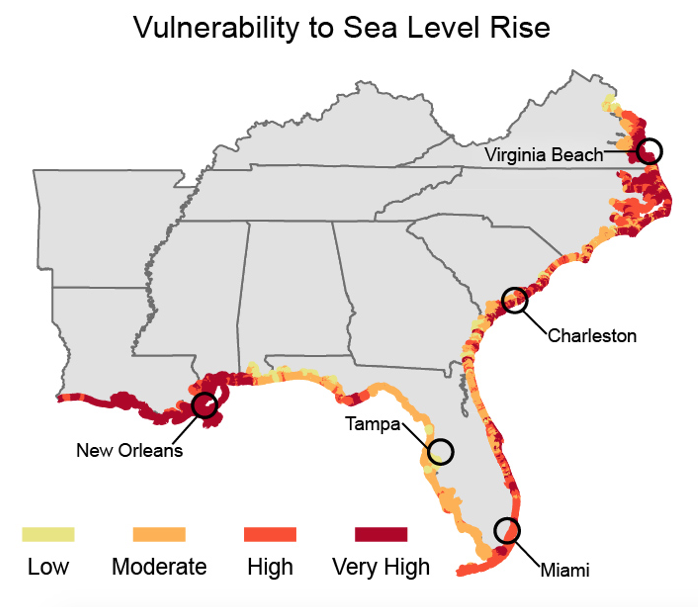By John Haughey
The Center Square
February 27, 2021
[Note: Due to a computer glitch, this article was not posted on its scheduled date, but is being posted on 3-10-2021.]
An estimated 300,000 Florida homes and $145 billion in taxable property are forecast to disappear after sea levels rise a projected 2.5 feet by 2050.
But already, more than 1 million of Florida’s 6.2 million residential properties are at “substantial risk” of non-tidal flooding with nearly $8 billion in diminished property values expected this year alone.
And, already, non-tidal flooding is among factors causing Florida property insurance rates to skyrocket as much as 45 percent. Also, at least 1 million of the 1.7 million Florida landowners enrolled in the National Flood Insurance Program (NFIP) are expected to see sticker shock when flood insurance rates are reset in October.

Unlike the eight years under climate change-denying Gov. Rick Scott, when Gov. Ron DeSantis assumed office in January 2019, he made it clear: The state would not engage in ideological debates when rising sea levels are destroying Florida homes and businesses.
That is exactly what Florida lawmakers will do when their 60-day legislative session begins Tuesday, House Speaker Chris Sprowls, R-Palm Harbor, said Friday while unveiling a slate of bills designed to mitigate rising sea levels.
“While some continue to debate word choices, we’re rolling up our sleeves and focusing on real problems that affect real business owners and real homeowners in our community,” he said, calling sea level rise and flooding “two of the most pressing issues of our time.”
Speaking at the University of South Florida’s St. Petersburg campus on Tampa Bay alongside four House reps and two senators, Sprowls called the bills the “most robust agenda to mitigate flooding and sea level rise the state of Florida has ever seen.”
Among them is a yet-unfiled companion bill to be sponsored by Sen. Ray Rodrigues, R-Estero, and by Rep. Demi Busatta Cabrera, R-Coral Gables, to dedicate $100 million annually, beginning this year, to mitigate “realities” of sea level rise and flooding.
“We are encouraging regional resilience coalition’s to engage in their communities and support local efforts to apply for state and federal dollars,” Cabrera said. “This will bring more money directly into our communities.”
Rodrigues is also cosponsoring Senate Bill 514 establishing the Florida Office of Resiliency and a Statewide Sea-Level Rise Task Force. The bill has passed one committee. House companion, House Bill 315, sponsored by Rep. Chip LaMarca, R-Lighthouse Point, awaits hearings.
The also yet-unfiled “Always Ready: Flooding & Sea Level Rise Act” would establish a Resilient Florida Grant Program to provide funding for local governments to address rising sea levels and create a three-year Statewide Flooding & Sea Level Rise Resilience Plan to identify risks, establish a Florida Flood Hub for Applied Research & Innovation, and encourage formation of regional resilience coalitions.
The bill will likely be an omnibus package with part, or all, of related bills incorporated into it. It will be filed by the House State Affairs Committee, chaired by Rep. Ralph Massullo, R-Beverly Hills, who said 40 percent of businesses shut down by a natural disaster never reopen
“This legislation protects our homeowners from flooding events that upend lives, as well as our state’s business owners – the backbone of our economy,” Massullo said.
Companion resolutions, HJR 1377 filed by Rep. Linda Chaney, R-St. Petersburg, and SJR 1182, sponsored by Sen. Jeff Brandes, R-St. Petersburg, provides tax breaks to homeowners who elevate properties.
“These bills encourage homeowners to take the steps necessary to protect our homes and families from the devastating impacts of flooding,” Chaney said.
Among other bills touted by Sprowls is HB 901, filed by Rep. Robin Bartleman, D-Weston, and SB 1252 filed by Sen. Lori Berman, D-Delray Beach, to, among other things, require the state to annually assess “future expenditures by federal, state, regional, and local governments necessary to improve resilience to inland and coastal flooding.”
“Love that Rep. Bartleman’s bill is included!” tweeted Rep. Allison Tant, D-Tallahassee, one of HB 901’s co-sponsors.
Sprowls said the effort is solidly bipartisan.
“Together,” he said, “we can build a stronger and more resilient Florida.”
 An exhaustive researcher and insightful interviewer accomplished in quickly gathering information from many sources to meet real-time needs for ghostwriting, blogging, web content writing, SEO and web page writing, John Haughey simultaneously tracks trends and develops proprietary feature packages from concept to conclusion. Haughey has won Associated Press awards in five states for reporting and writing. He covers government stories for The Center Square.
An exhaustive researcher and insightful interviewer accomplished in quickly gathering information from many sources to meet real-time needs for ghostwriting, blogging, web content writing, SEO and web page writing, John Haughey simultaneously tracks trends and develops proprietary feature packages from concept to conclusion. Haughey has won Associated Press awards in five states for reporting and writing. He covers government stories for The Center Square.

Thanks for the informative graphics. Will credit you. We need to wean ourselves off
of fossil fuels as soon as possible. Rapid climate change is something that affects everyone worldwide. Changing weather patterns, continuing drought and violent storms are hard for humans and especially for the flora and fauna. Whole ecosystems are being destroyed by fires and massive flooding all over the world. Blessings on all the refugees who are seeking new lives in strange lands. Blessings on the children who are our future.
Blessings on the whole planet, our once so beautiful home on Earth.